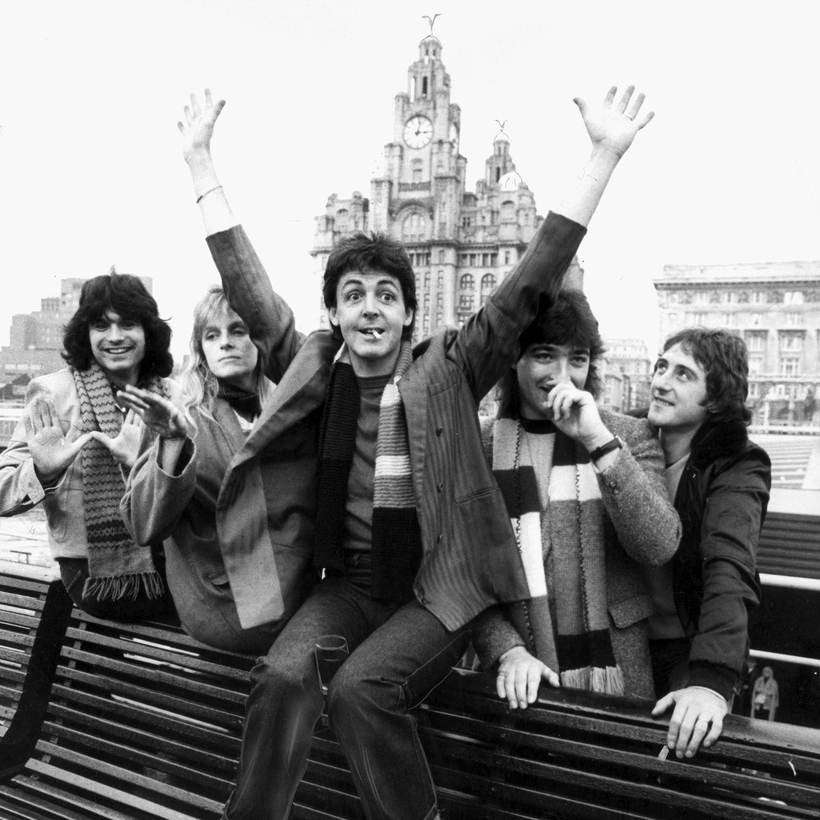“They went up to Paul’s for New Year’s Eve in Liverpool,” the former Wings drummer Denny Seiwell explained to me about a flustered phone call he fielded from Paul McCartney on December 31, 1972. “Paul called me—I was in the States—and he said, ‘Jesus, Henry [McCullough, the Northern Irish Wings guitarist] and his wife, Sheila, had a big fight. They were out in the streets and everything. They were so drunk.’ I said, ‘He’s not my problem, man—sorry.’”
Seiwell chuckled as he reminisced about his somewhat turbulent time in McCartney’s post-Beatles group. On the other end of the telephone line I raised a curious eyebrow.
On the surface, the Lehighton, Pennsylvania–born drummer’s musing during our conversation for my book, The McCartney Legacy: Volume I, was just another tale of rock ’n’ roll debauchery, plucked from his remarkable memory bank and supported by the diaries that he and his wife, Monique, kept at the time.

McCartney pulling apart McCullough and Sheila outside his father’s home, near Liverpool, was actually at the lower end of the excess scale for McCullough. He once dashed off the stage to throw up while performing McCartney’s hit ballad “My Love” on the British TV program Top of the Pops, and he had been known to play guitar solos from the stage floor when his fondness for multiple pints of Guinness got the better of him.
But unlike these other misdemeanors, evidence of which has survived only in writing and a few anecdotes, McCullough’s New Year’s Eve dustup would be immortalized on one of the biggest-selling records of all time. And thanks to Seiwell, I had just connected the dots.
At the start of 1973, McCartney’s group gathered at EMI’s Abbey Road Studios to add the finishing touches to their second album, Red Rose Speedway. Wings had been laboring over the record, on and off, for nine months. In the next room, prog rockers Pink Floyd had reached a similar juncture in the making of their next LP, The Dark Side of the Moon.
In the zenith of rock ’n’ roll, creative cross-pollination was the norm at EMI’s legendary London studios, and on January 19 and 20, 1973, McCartney’s Wings and Pink Floyd joined forces, on Floyd’s turf.

In the spirit of the American avant-garde composer John Cage, Pink Floyd wanted to record abstract voices that would be woven into the fabric of several songs. Roger Waters drafted a series of questions about madness, violence, and mortality and wrote them out on a set of cards. These were placed, facedown, on a music stand in EMI Studio Three, and outsiders were invited to turn the cards over and answer Waters’s questions on tape.
The questions included: “Does death frighten you?”; “When was the last time you were violent?”; “Were you in the right?”; “Do you ever think you’re going mad?”; and “If so, why?” Contributors sat on a stool and were asked to respond openly and honestly with the first answer that came to them.
Among those Pink Floyd enlisted for the project were their manager and his wife, Peter and Patricia Watts; one of their roadies, Chris Adamson; and EMI’s doorman Gerry O’Driscoll. Between mixing sessions for Red Rose Speedway, McCartney and his wife, Linda, decided it might be fun to contribute, too, as did Henry and Sheila McCullough.

Pink Floyd drummer Nick Mason remembered being thrilled to have “two such famous voices” as Paul’s and Linda’s, but alas, he and the rest of Pink Floyd found them to be “too guarded,” and too intent on coming up with something cleverly amusing, to fully embrace the spirit of the exercise, so their responses went unused.
Henry and Sheila, by contrast, were just what Pink Floyd had hoped for. When Henry turned over the card asking about the last time he was violent, he had to cast his mind back only as far as his fight with Sheila at Paul McCartney’s New Year’s Eve party.
And so it was that a hazy recollection of McCullough’s—“I don’t know, I was really drunk at the time!”—found its way into the opening chords of “Us and Them,” a track on one of the most revered albums in the history of popular music.
On its own, Denny Seiwell’s recollection made for an entertaining yarn. In a broader context, it proved that, if a vignette rooted in a brawl at a holiday get-together with the McCartney family could make it into the grooves of The Dark Side of the Moon, nothing is Beatle-proof.

Adrian Sinclair’s The McCartney Legacy: Volume I, 1969–73, written with Allan Kozinn, will be published by Dey Street on December 13


